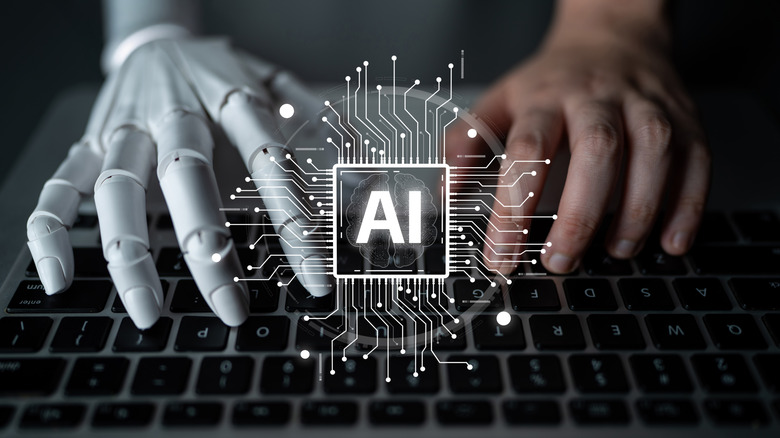Walmart's CEO Is Going 'On Offense' When It Comes To AI Replacing Jobs
Artificial intelligence is changing work, no matter the industry. Companies like OpenAI, Microsoft, Anthropic, and countless more are pushing AI to the forefront and seeing how it can be used to supposedly improve society. Naturally, this exploration has led to fears over AI taking jobs, which, with instances like IBM's recent 8,000 AI revolution-induced layoffs, are far from unfounded. At the same time, prominent CEOs remain confident that AI implementation won't prove as disastrous as it might seem, so long as company decision-makers remain vigilant.
For instance, per Axios, Walmart's CEO Doug McMillon reassured the public that the company doesn't plan to leave workers out to dry as AI becomes more prevalent. "Every job we've got is going to change in some way — whether it's getting the shopping carts off the parking lot, or the way our technologists work, or certainly the way leadership roles change," he explained at a Harvard Business Review event, expanding on how Walmart employment could change in the future. He said that Walmart Academies will develop programs to get employees more familiar, engaged, and focused with AI in their workflow, noting that he expects AI to create as many new roles as it will replace.
Whether McMillon's vision for Walmart's future will come to fruition as hoped remains to be seen. One can only hope it does to some extent, given AI's current impact on the job market and the push from other CEOs for its wider adoption.
How AI is impacting employment and what other CEOs think of it
Concern about AI taking over jobs is far from a fantasy. While the World Economic Forum expects that AI will create roughly 170 million jobs over the next 10 years, it acknowledges that entry-level, white-collar jobs may be harmed by this advancement. The organization anticipates approximately 92 million jobs being displaced in some way due to AI, while, according to its 2025 Future of Jobs Report, approximately 40% of employers foresee shrinking their workforce in favor of AI automation. Not to mention that an increasingly AI-heavy job landscape will require workers to develop whole new skillsets, making the remaining jobs potentially more difficult to obtain.
Even with this grim forecast and the uncertainty surrounding AI in the workplace, Walmart's CEO isn't the only one hoping to utilize the tech more heavily in the coming years. Target's new CEO, Michael Fiddelke, seems all-in on AI, seeking to leverage it to improve customer experiences, tighten up the business structure, and retire older, outdated tech. He highlighted manual work that can be accomplished with automation as one of the company's major pitfalls, indicating potential job loss down the line (via Constellation Research). Meanwhile, Take-Two CEO Strauss Zelnick went as far as to claim that AI will increase employment in video game development and beyond, as reported by Game Developer, although he remains adamant that AI is incapable of true creativity.
There are multiple things AI shouldn't be used for, though many CEOs seem eager to test it out wherever they can. Hopefully, its continued use and expansion will bring about some positives in the job market, instead of the unstoppable wave of negatives it has the potential to create.

